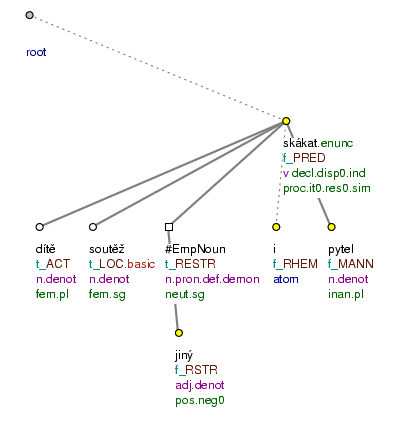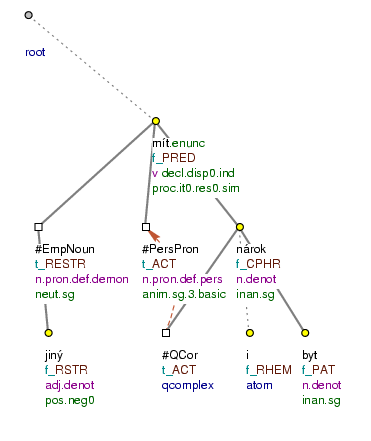Constructions identified as constructions signifying exceptional conjoining are constructions in which the typical restrictive meaning of the preposition is absent but which do not have the meaning of simple conjoining either. Both conjoined constituents are semantically more closely defined: one by the meaning of "commonplace, self-evident", the other conjoined constituent, by contrast, has the meaning of "unusual, exceptional".
The meaning of exceptional conjoining is expressed by the prepositions:
| kromě (=besides/except) |
| mimo (=except) |
| vedle (=apart from/as well as) |
Cf:
-
Kromě ní tam byl i Mirek. (=Besides her, Mirek was there as well.)
= Byla tam nejen ona, ale i Mirek. (=Not only she was there, but Mirek as well.) Cf. Fig. 8.121.
The effective root node of the construction signifying exceptional conjoining is assigned the functor RESTR and in the tectogrammatical tree it is dependent on the node for the governing verb of the governing clause.
In the annotation of constructions signifying exceptional conjoining a distinction is made between:
-
direct exceptional conjoining .
The effective root node of the construction signifying exceptional conjoining is the node representing the governing (syntactic) noun of the prepositional phrase.
-
exceptional conjoining with ellipsis of the verb.
The effective root node of the construction signifying exceptional conjoining is not the node representing the governing (syntactic) noun of the prepositional phrase, but the newly established node for the verb.
-
exceptional conjoining attached by the expression "kromě/vedle/mimo toho, že (=besides/except for the fact that)".
Direct exceptional conjoining. The node representing the governing (syntactic) noun of the prepositional phrase is the effective root node of the construction signifying exceptional conjoining in cases where this noun is in the case governed by the preposition, i.e. kromě+2, mimo+4 (in the texts the genitive is also - substandardly - used), vedle+2. (Reference to the preposition is stored in the attribute a/aux.rf at the node of the governing noun.)
Examples:
Kromě legislativních změn.RESTR došlo i k věcným změnám. (=Besides the legislative changes, material changes also took place.) Fig. 8.123
Vedle historie.RESTR studovala češtinu. (=Besides history, she studied Czech.)
Kromě základních údajů.RESTR , které takové reklamy obvykle mají, uváděl i důležité informace pro kupující. (=Besides the basic data such advertisements usually contain, it also provided useful information for shoppers.)
Kromě informací.RESTR o české ekonomice přinášíme i seznam firem, které mají zájem obchodovat. (=Besides information about the Czech economy, we also offer a list of companies interested in trading.)
Two events can also be directly connected. The prepositions kromě (=besides) (mimo (=besides), vedle (=as well as)) are followed by:
-
nominalisation of the verb (deverbal or event noun).
For example:
Kromě prodeje.
RESTRchce slovinská firma v ČR i vyrábět. (=Besides selling, the Slovenian company also wants to manufacture in the Czech Republic.) Fig. 8.125Měli jste k tomu kromě zvýšení.
RESTRpříjmů ještě jiné důvody? (=Did you have any other reasons for this apart from the pay rise?)Kromě hraní.
RESTRna klavír ještě zpívá. (=Besides playing the piano, he/she sings as well.) -
the pronoun referring to the event (a relationship of co-reference is represented between the pronoun and the verb, deverbal or event noun).
For example:
(Mnoho informací je na Internetu.) Kromě toho.
RESTRve všech novinách jsou dnes o tom rubriky. (=(There is a lot of information on the Internet.) Besides that, all the newspapers carry headlines about it today.) Fig. 8.126(O prázdninách budu pracovat na zahradě.) Kromě toho.
RESTRpojedu do Německa. (=(During the holidays I will work in the garden.) Besides that, I will go to Germany.)
In the annotation of constructions with the set expressions kromě jiného (=inter alia), mimo jiné (=inter alia) a new node is added to the tectogrammatical tree for the noun governing the adjective jiný (=other), a node with the t-lemma substitute #EmpNoun. This added node has the functor RESTR and is dependent on the effective root node of the main clause. For example:
Děti budou na soutěži mimo {#EmpNoun.RESTR} jiné i skákat v pytlích. (=At the contest, the children will, amongst other things, take part in a sack race.) Fig. 8.127
Kromě {#EmpNoun.RESTR} jiného má nárok i na byt. (=Amongst other things, he/she also has the right to an apartment.) Fig. 8.128
Institut kromě {#EmpNoun.RESTR} jiného zjistil, že při používání biohrnce dochází ke spálení povrchového laku. (=Amongst other things, the Institute discovered that the the painted surface was burned when the bio-pan was used.)
!!! The abbreviation mj. (=inter alia) is represented by a node with the t-lemma mj. in the data. The functor RESTR is assigned directly to this node.
Exceptional conjoining with ellipsis of the verb. The newly established node for the verb is the effective root node of the construction signifying exceptional conjoining in cases where the governing (syntactic) noun of the prepositional phrase is in a case other than that governed by the preposition, or if the prepositions kromě (=besides), mimo (=besides) and vedle (=apart from/as well as) are followed by another prepositional phrase. (A reference to the preposition is stored in the attribute a/aux.rf at the added node for the verb.)
The newly established node is usually a copy of the node for the verb in the main clause (a node with the t-lemma substitute #EmpVerb may be added). The rule regarding negation of the added verb is: if the verb in the main clause is negated, the added verb is also negated and vice versa. Cf.:
-
Kromě do Říma chtěli jet i do Benátek. (=Besides Rome, they also wanted to go to Venice.)
= Kromě toho, že chtěli jet do Říma, chtěli jet i do Benátek. (=Besides wanting to go to Rome, they also wanted to go to Venice.)
The effective root node of the construction signifying exceptional conjoining will be a newly established node for the verb, which will be a copy of the node for the verb in the main clause. Cf. Fig. 8.122.
The reason for the addition of a node for the verb is the fact that the existing case form of the noun phrase is not determined by the preceding preposition; thus the case form of the noun phrase in the restrictive construction can only come from the elided verb; this analysis also enables the noun phrase to be assigned a corresponding functor, which would otherwise be covered by the functor RESTR.
!!! However, constructions in which the prepositions (kromě (=except/besides), mimo (=except), vedle (=apart from/as well as)) are followed by a form other than that governed by the preposition do not occur in PDT.
Exceptional conjoining attached by the expression "kromě/vedle/mimo toho, že (=besides/as well as/apart from the fact that)". In constructions attached by the expression "kromě/vedle/mimo toho, že (=besides/as well as/apart from the fact that)" the expression "toho (=the fact)" is treated as a supporting word (see Section 5.3, "Supporting expressions") and the functor RESTR is assigned to the effective root node of the dependent clause. For example:
<Kromě toho, že> byl.RESTR učitelem, byl i dobrým člověkem. (=Besides being a teacher, he was also a good man.) Fig. 8.124
!!! The method of representing constructions signifying exceptional conjoining will have to be re-assessed. The existing solution does not indicate with which modification of the main clause the constituent attached by the preposition kromě (=except/besides) (mimo (=except/besides), vedle (=apart from/as well as)) is conjoined. Cf.:
-
Kromě Pavla políbila dcerušku i matka. (=Besides Paul, the mother also kissed the little daughter.)
= Nejen Pavel, ale i matka políbila dcerušku. (=Not only Paul, but also the mother kissed the little daughter.)
-
Kromě Pavla políbila matka i dcerušku. (=Besides Paul, the mother also kissed the little daughter.)
= Matka políbila nejen Pavla, ale i dcerušku. (=The mother kissed not only Paul but also the little daughter.)
Figure 8.121. Construction signifying exceptional conjoining
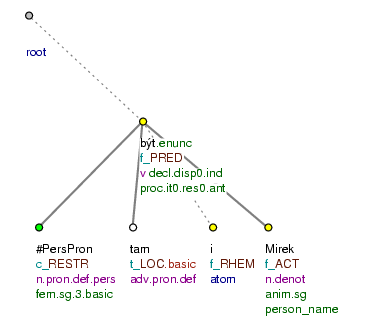
Kromě ní tam byl i Mirek. (=lit. Besides her there was also Mirek.)
Figure 8.122. Construction signifying exceptional conjoining
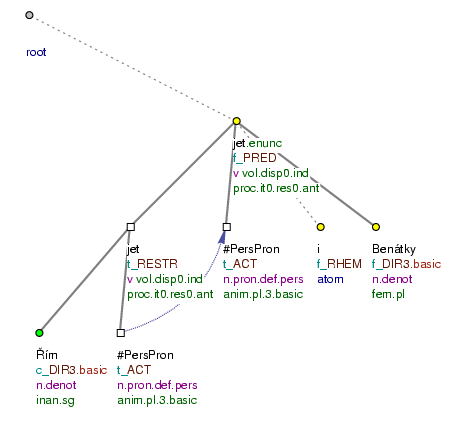
Kromě do Říma chtěli jet i do Benátek. (=lit. Besides to Rome (they) wanted to_go also to Venice.)
Figure 8.123. Construction signifying exceptional conjoining
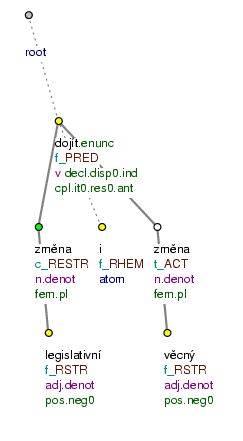
Kromě legislativních změn došlo i k věcným změnám. (=lit. Besides legislative changes took_place also - material changes )
Figure 8.124. Construction signifying exceptional conjoining
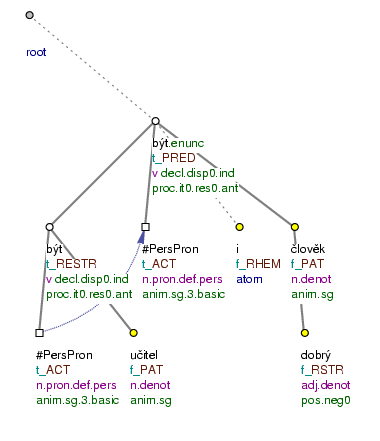
Kromě toho, že byl učitelem, byl i dobrým člověkem. (=lit. Besides that, that (he) was (a) teacher, (he) was also (a) good man.)
Figure 8.125. Construction signifying exceptional conjoining
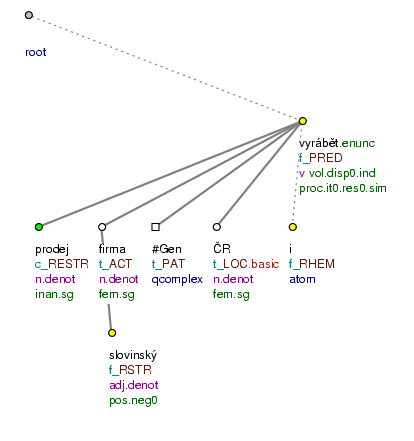
Kromě prodeje chce slovinská firma v ČR i vyrábět. (=lit. Besides selling, wants (the) Slovenian company in CR also to_manufacture.)
Figure 8.126. Construction signifying exceptional conjoining
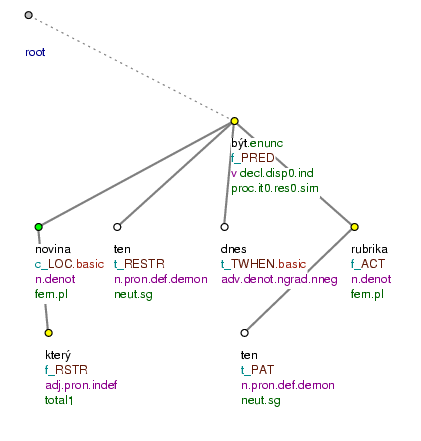
(Mnoho informací je na Internetu.) Kromě toho ve všech novinách jsou dnes o tom rubriky. (=(There is a lot of information on the Internet.) lit. Besides that in all newspapers are today about it headlines.)
